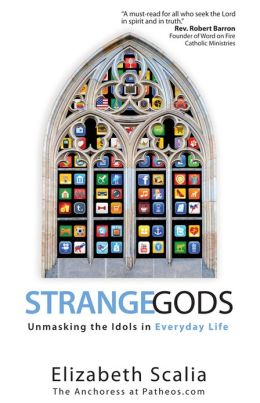It’s odd. Finding God in middle age brought more joy and peace into my life than I ever thought to expect, and yet listening to people talk about religion and reading modern writers on the subject often leaves me cold, alienated. I don’t care how brilliantly they refute the atheists. I don’t care whom they think God wants me to sleep with, or how they believe I should say my prayers. When they tell me I cannot call myself a Christian unless I condemn what they condemn and despise whom they despise, it makes me faintly nauseous. And though I’ve read many sentences that begin “If you only knew your Bible, you would see…” I’ve never reached the end of any of them.
What good religious discourse does — what good religious writing does — what they do for me, at least — is reorient my spirit toward its lodestar, which is Christ. For some reason, this is less likely to be achieved through flashy logic and pompous denunciations than through humble seeking and painfully honest self-examination. Go figure.
At any rate, here’s a lovely little book of really good religious writing: Strange Gods, by Elizabeth Scalia, who is also known by her blogging name The Anchoress. For reasons I’ll explain, it is an excellent corrective to our ferocious historical moment.
I was first led to the Anchoress by — who else? — Instapundit, (Him By Whom All Good Things are Linked!). I was taken with the gracefulness of her prose and the graciousness of her outlook and often found them an antidote to the fever of political confrontation. It’s not that she doesn’t have her opinions, she just usually manages to remain open-hearted toward her opposition while expressing them. No common thing these days and no mean trick either.
In Strange Gods, subtitled “Unmasking the Idols in Everyday Life,” she examines a few of the infinite ways in which she and all the rest of us break the first commandment. She speaks personally and movingly about how an excess of attention to ego, ideas, ideology, coolness, sex — even the films made from Jane Austen novels! — can position these false idols between ourselves and the source of all goodness.
Why do people allow their relationship with God to become disoriented? Sadly, the problem usually starts with love. The human heart craves attention and love — love is the common longing of our lives. We may search for a career, or wealth, or status, but the desire to be loved and valued is usually at the root of our strivings…. Sometimes, discouraged or impatient in our search, we chase illusions…
I believe much of modern politics, philosophy, and science is constructed to make us forget this unbearable longing — to convince us it’s sex we’re after, or evolutionary advantage, or money, or some other kind of material self-interest. Scalia’s right. It’s love — it always has been, since creation. The fact that she builds her meditation on this simple but difficult truth gives her book substance and power.
For those of us both interested in and appalled by this moment in American politics — for those like me who sometimes look at decent people in political life and wonder how on earth they can do the things they do and say the things they say — Scalia’s chapter on what she calls Super Idols (ideologies) is a small revelation.
Determine that the opposition is not merely wrong but evil, and suddenly mere ideas become glittering certainties. These certainties give us permission to hate and tell us our hate is not just reasonable but pure. If simple idolatry blocks our view of God, the super idol — because it is so highly burnished — makes us think we are seeing God in our hatred.
It’s easy for me to see how such super-idolatry has led our left-leaning administration into tyrannical corruption and our left-leaning media into willful blindness and dishonesty. Not so easy is acknowledging the prevalence of this tendency in right wingers as well, even, on occasion, some who look uncannily like myself.
But this is what I mean by reorienting the spirit. When we are reminded of such all-too-human errors— in good prose, by a writer of assiduous humility and self-awareness — it dims the bright distractions of our righteous indignation for a little while at least and helps us get our hearts back on course.
This is what good religious writing can do. This is what Strange Gods does. Take time out from the latest all-consuming brouhaha and read it.
*****











Join the conversation as a VIP Member